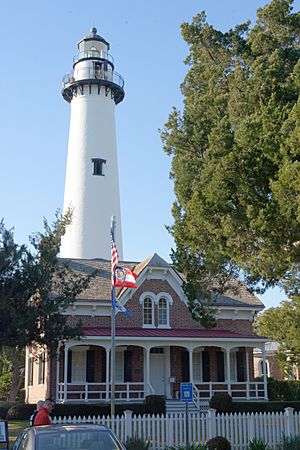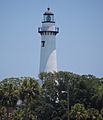St. Simons Island Light facts for kids
 |
|
| Lighthouse and keeper's house | |
| Location | 600 Beachview Dr., Saint Simons Island, Georgia |
|---|---|
| Coordinates | 31°08′03″N 81°23′37″W / 31.13411°N 81.39358°W |
| Year first lit | 1872 |
| Automated | 1954 |
| Foundation | Tabby |
| Construction | Iron and brick |
| Tower shape | Frustum of a cone |
| Markings / pattern | White tower attached to a two-story brick dwelling with red roof |
| Height | 104 feet (32 m) |
| Original lens | Third-order Fresnel lens |
| Characteristic | continuous white light with a more intense flash every 60 s |
The St. Simons Island Light is a famous lighthouse located at the southern tip of St. Simons Island, Georgia, in the United States. Its main job is to help ships find their way into St. Simons Sound. It also warns them about the many hidden sandbars in the water.
Contents
History of the Lighthouse
The First Lighthouse
The very first St. Simons Island lighthouse was built a long time ago, in 1810. It was about 75 feet (23 meters) tall. This early lighthouse had eight sides and a lamp that burned oil.
During the American Civil War, the U.S. military blocked the coast. In 1862, U.S. Army troops arrived and forced the Confederate soldiers to leave the area. As they left, the Confederate troops destroyed the lighthouse. They did this to stop it from helping U.S. Navy warships navigate.
Building the Current Lighthouse
After the war, the U.S. government decided to build a new lighthouse. They built it a little to the west of where the old one stood. This new lighthouse is made of brick and is 104 feet (32 meters) tall. It was finished in 1872.
The lighthouse uses a special Fresnel lens. This type of lens helps make the light very bright and focused. The St. Simons lens is one of only 79 such lenses still working in the United States today. This rotating lens sends out four beams of light. You can see one strong flash every 60 seconds. To reach the top, you climb 129 steps on a spiral staircase made of cast iron.
In 1934, an electric light replaced the old kerosene lamp. The lighthouse became fully automated in 1953. This means it could run on its own without a keeper always being there.
On July 1, 1939, the United States Lighthouse Service became part of the US Coast Guard.
In 1972, the Coast Guard added two more lights. These are called rear range lights. They are on towers at the entrance to the Frederica River. If ships keep the lighthouse centered between these two lights, they stay in the middle of the entrance channel. This shows that the lighthouse is still very important for guiding ships.
The Lighthouse Museum
In 1972, the building where the lighthouse keepers used to live was rented out. The Coastal Georgia Historical Society worked for three years to fix up this two-story Victorian house. They turned it into a museum. In 1984, they also started managing the lighthouse itself.
Today, visitors can pay a fee to explore the museum. They can also climb the 129 steps to the top of the lighthouse. From there, you get an amazing view of St. Simons Sound and the area around it.
The lighthouse tower has been repaired and updated several times. This happened in 1989–91 and again in 1997–98. On May 26, 2004, the Coastal Georgia Historical Society officially took ownership of the lighthouse. This happened under a special law called the National Historic Lighthouse Preservation Act.
The light inside the lighthouse is kept working by the United States Coast Guard Auxiliary.
The St. Simons Lighthouse is a beloved symbol of St. Simons Island. It helps mark the line that separates St. Simons Sound from the big Atlantic Ocean. Many artists have painted pictures of this beautiful lighthouse.
Recent Renovations
In 2010, the St. Simons Island lighthouse had a big renovation. It was closed to visitors for several months. Workers cleaned off all the old paint from the inside and outside. They then repainted it. Eight iron posts at the top of the tower were replaced. These new posts were made to look exactly like the old ones. All the other ironwork was also cleaned and fixed.
During this work, they took great care to protect the valuable Fresnel lens. They wrapped it in bubble wrap and then shrink-wrapped it. Finally, they put it inside a strong wooden box. A temporary spotlight was used to guide ships while the main light was being worked on.
Lighthouse Keepers
Here are some of the people who were in charge of keeping the lighthouse light burning:
- James Gould (1811–1837)
- Lachlan McIntosh (1837–1852)
- Alexander D. McIntosh (1852–1855)
- John F. Carmon (1855–1861)
- Bradford B. Brunt (1872–1874)
- Frederick Osborne (1874–1880)
- George W. Ashbell (1880–1883)
- Isaac L. Peckham (1883–1892)
- Joseph Champagne (1892–1907)
- Carl O. Svendsen (1907–1935)
- Arthur F. Hodge (1936–1945)
- David O’Hagan (1945–1953)
Visiting the Museum
The Coastal Georgia Historical Society lets people climb the 129 steps of the lighthouse tower. They also run the St. Simons Lighthouse Museum. This museum is located in the 1872 house where the lighthouse keepers used to live.
The Society's main office is in the A. W. Jones Heritage Center next door. This center has exhibits, a research library, and a museum shop. The Society also manages the World War II Home Front Museum on St. Simons.
Images for kids






